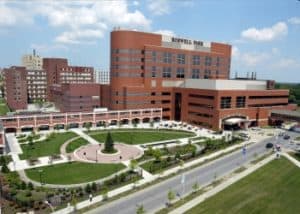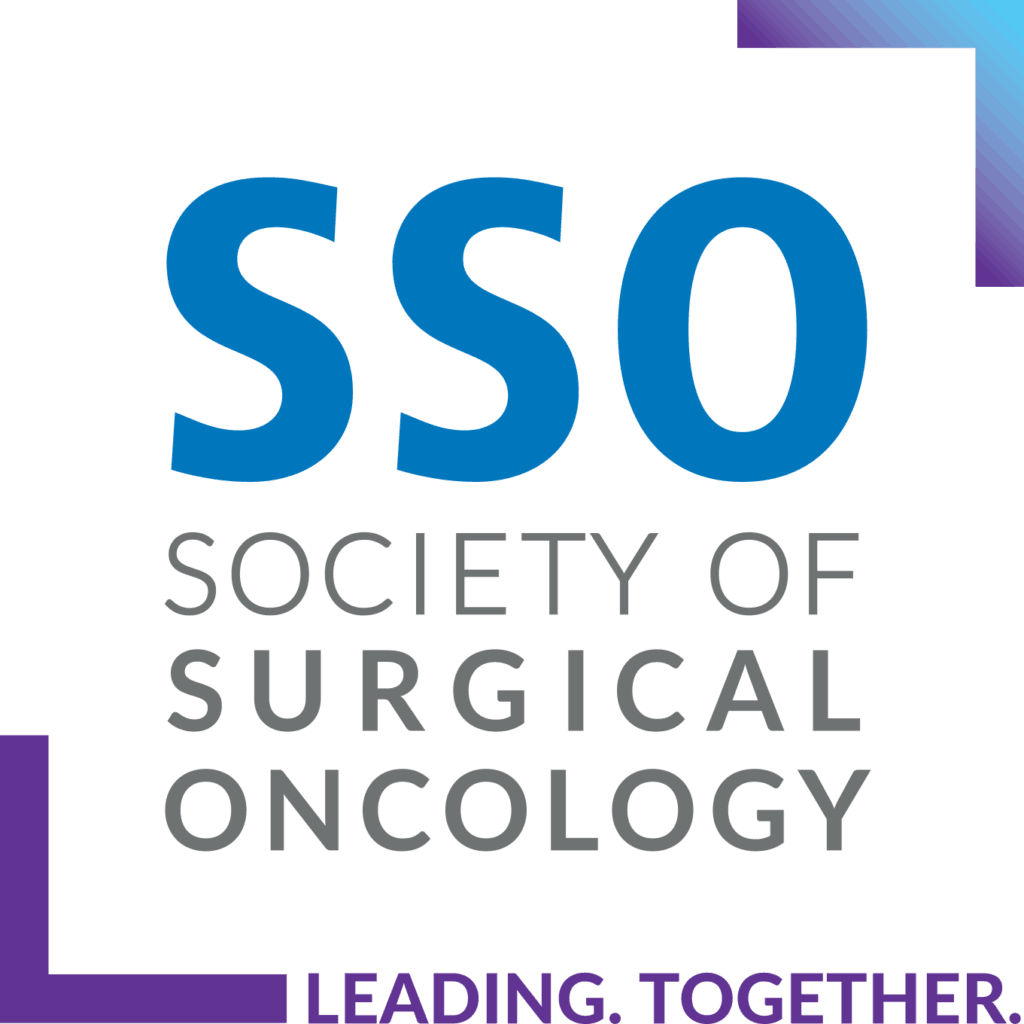Buffalo, New York
Department Chair: Moshim Kukar, MD
Training Program Director: Moshim Kukar, MD
Training Program Assistant Director: Shalana O’Brien, MD
Training Program Coordinator: Carrie Racsumberger, MS

Founded in 1898, Roswell Park Comprehensive Cancer Center (RP) is the first facility in the world dedicated specifically to research into the cause, prevention, and treatment of cancer. A strong tradition in surgical oncology at RP began with the institute’s visionary founder, Dr. Roswell Park. That surgical tradition continues today in an academic Department of Surgical Oncology that is a core component of one of the nation’s leading cancer research and treatment centers.
About the Facility
RP is a free-standing National Cancer Institute designated Comprehensive Cancer Center with over 120 clinicians, 100 senior scientists, 3,000 employees, and $70 million in grants and research contracts. The RP strategic plan puts its highest priority on translational research, education, training, and high-quality care.
About the Program
RP has maintained a leading fellowship in Surgical Oncology for several decades, previously approved by the Society of Surgical Oncology. With the recent transition to ACGME oversight of our approved Complex General Surgical Oncology fellowship, RP has partnered with The Department of Surgery at the University of Rochester School of Medicine and Dentistry as our sponsoring program.
The fellowship accepts candidates for (4) four clinical fellowship positions per year. The clinical fellowship is a two-year program consisting of 14 months of core rotations at RP. Surgical oncology rotations include Upper GI Surgery, Hepatobiliary, Pancreas, Colorectal Surgery, Melanoma/Sarcoma, Breast, Endocrine, and Peritoneal Surface Malignancies.
The program has a major commitment to minimally invasive surgery. Faculty on the Upper GI and Colorectal services are committed to advanced laparoscopic and robotic surgery in pancreatic, gastric, hepatic, colorectal and thoracic surgery. RP has two Da Vinci robots in clinical use. In addition, RPCI has one of the nation’s leading minimally invasive training laboratories staffed full time and available for fellows including a core curriculum.
There are also a total of 2 months on the required subspecialty rotations (medical oncology, radiation oncology, pathology, and palliative care) months of ACGME mandated research time. In addition, there is an opportunity for sub-specialty clinical electives (thoracic, urology, gynecology, head and neck and plastics). At the conclusion of the clinical fellowship, the fellows have the essential knowledge and experience in multidisciplinary cancer care to enter into specialized academic surgical oncology practices.
Research Opportunities
There are extensive opportunities for clinical and translational research. Each fellow is expected to participate in clinical research projects that lead to peer-reviewed publications. Every faculty member provides support and concepts to help fellows in this effort. In addition, for interested fellows, there are opportunities for collaborative laboratory projects recognizing the limits on the ability to conduct laboratory research in a short time period.
There is also an opportunity for a concentrated research experience to prepare surgical oncology fellows for a research-oriented career. This is a National Cancer Institute-funded T-32 Training Grant opportunity that can be combined with the clinical fellowship. Fellows may do the T-32 program either before or after the clinical years of the fellowship. T-32 fellows choose from among any of the scientific programs at RP and twenty-five of the leading scientists at the Institute for their scientific mentorship. Opportunities include laboratories in genetics, immunology, pharmacology, and other basic science programs as well as translational research, epidemiology and health services research. Fellows who have completed the T-32 program are currently leaders in surgical oncology at many major medical schools across the United States and Canada.
Fellows who wish to pursue the combined clinical fellowship/T-32 program starting at the beginning of the fellowship can meet the requirements for both in 36 months.
Multidisciplinary Care and Disease-Specific Services
A hallmark of the clinical fellowship is that the rotations are concentrated into organ-site specific areas with faculty who specialize and are experts in that specific disease site. This provides the fellows with a focused experience in that area of surgical oncology without being pulled to other competing services or cases. They are integrally involved in the multidisciplinary evaluation, treatment planning, and surgical care of these cases as well as the didactic and scientific programs of each group. This specialization allows for the educational program to be highly focused during the fellow’s rotation on a given service. The fellow also participates in weekly case conferences on that service.
All of the clinical services at RP are provided in multidisciplinary clinics in collaboration with medical and radiation oncology. Additional support services are also available in these clinics ranging from genetics, imaging, nursing support, psychology, social service, and patient education. In most clinics, the surgical oncology service provides the initial evaluation of new cancer patients. The clinic experience provides the opportunity for interaction with colleagues from other disciplines for true multidisciplinary treatment planning.
Didactic Program
The RP fellowship program has a long tradition of excellent didactic courses and lectures. In addition to weekly M&M, there is a Grand Rounds that includes national leaders in cancer care brought to the Institute for the purpose of fellow education. There are also structured topic journal clubs, weekly fellow meetings with topics like career development and mock oral boards; service based case conferences and core conferences for the fellows. The 2-year core oncology curriculum provides the necessary foundation in basic and clinical sciences. Fellows are also required to attend meetings of the institution’s Scientific Review Committee and Institutional Review Board as part of their training in the conduct of clinical research.
Faculty
The faculty is all full-time staff at RP and do not rotate to other hospitals or have clinical commitments beyond RP. Each has a major focus in a disease or organ system (e.g. breast, upper GI, hepatobiliary, pancreas, colorectal, endocrine, sarcoma, melanoma, etc.) and specific areas of academic interest.
Residents and Other Trainees
As a free-standing cancer center, fellows do not have to rotate on services that provide general surgery or trauma care. Every experience is focused 100% on patients with cancer. There are a limited number of junior general surgery residents from the University at Buffalo at RP, but their service assignments are made specifically so that they will not compete with or detract from the surgical oncology fellowship training. University at Buffalo medical students also rotate on the surgical oncology services at RP.
Post-Fellowship Positions
Finishing fellows all have excellent career opportunities. A majority enter academic or teaching positions. Some enter high-quality clinical practices. There is no set formula for accepting trainees based upon their future career goals. We are looking for surgeons who are likely to be leaders in the field of surgical oncology and their communities.
Application Requirements
Applicants should have completed training in general surgery by the time they begin the fellowship and be board eligible or certified by the American Board of Surgery (or the outside equivalent). They must be also eligible to participate in an ACGME approved fellowship and for medical licensure in the State of New York. Applicants who are not citizens or permanent residents of the United States may be considered only if they would be eligible for a J1 visa during their fellowship training. Application for the fellowship program is currently through ERAS and the deadline for application submission is based upon the ERAS closing date. Invited applicants must be interviewed in person at one of the two interview sessions.
Contact Information
| Training Program Director: | Moshim Kukar, MD |
| Training Program Assistant Director | Shalana O’Brien, MD |
| Address: | Department of Surgical Oncology Roswell Park Comprehensive Cancer Center Elm and Carlton Streets Buffalo, NY 14263 |
| Program Coordinator: | Carrie Racsumberger, MS |
| Phone: | 716-845-2359 |
| Email: | Carrie.Racsumberger@RoswellPark.org |






